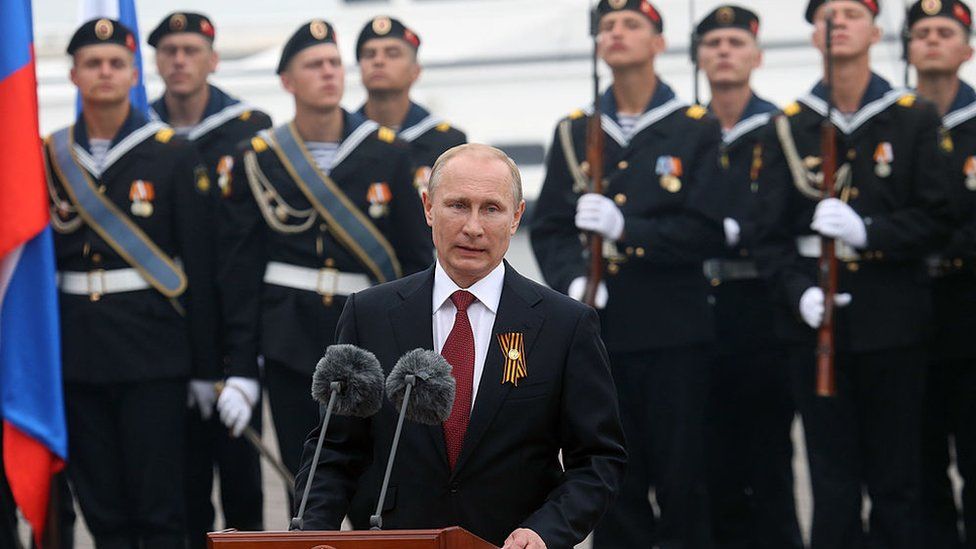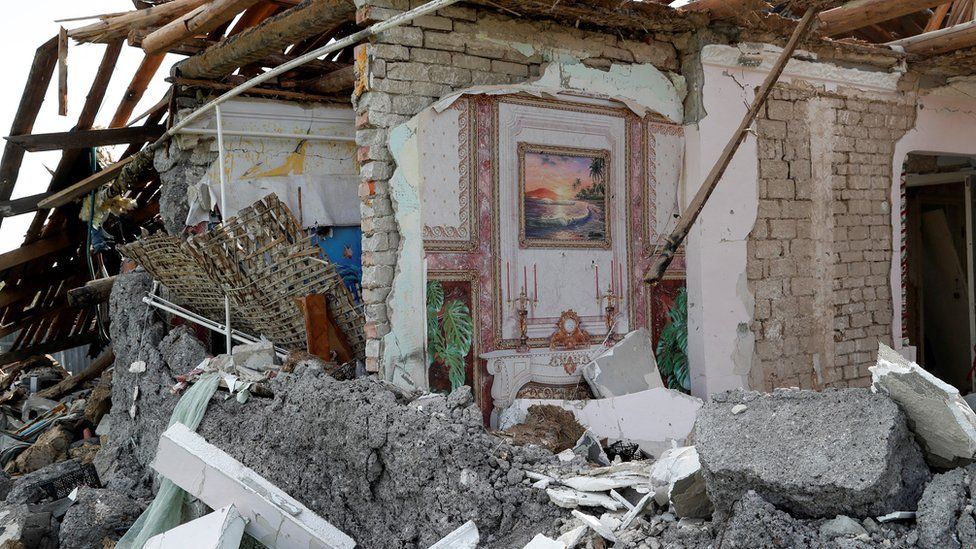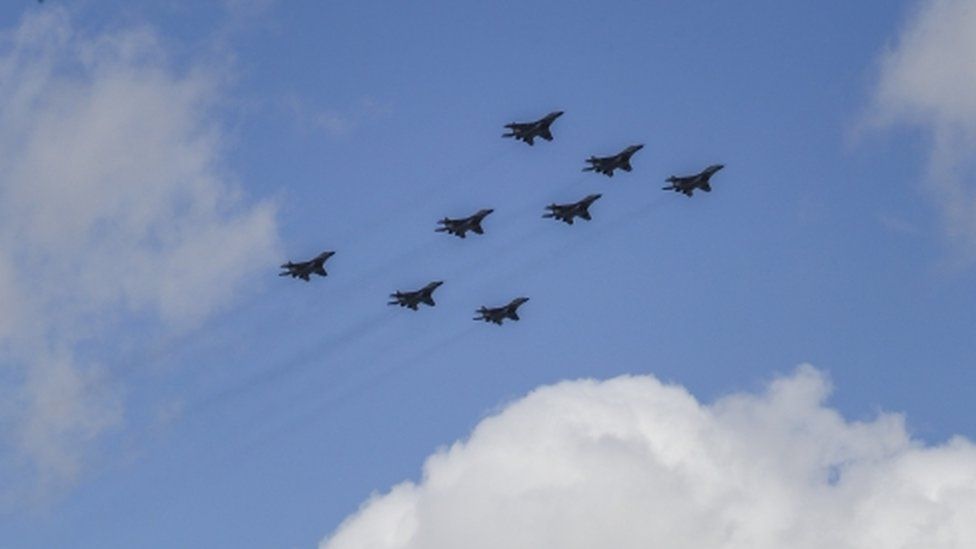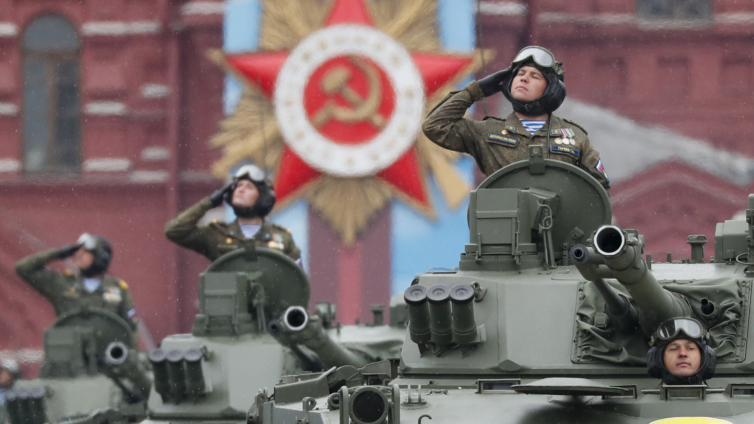It has become an annual event - the military parade in Red Square in Moscow and cities across Russia on 9 May, marking victory over Nazi Germany in 1945.
Under Vladimir Putin, Victory Day has become a show of strength of troops and military hardware, as well as a chance to remember the sacrifices of World War Two. Twenty-seven million Soviet citizens died, by far the greatest loss of any country, in what Russians call the Great Patriotic War.
This year, the event has taken on a significance of its own. Far from liberating Europe, Russia has waged months of war against its neighbour Ukraine and is devoid of any real form of military victory that it can celebrate.
Regiments that played a key role in the war will parade in front of the top brass and the president, whose address will echo across Red Square and be scrutinised for what to expect next. Russia's leader often uses this moment to send messages of intent.
The Victory Day parade was occasionally marked in the Soviet era and revived by President Boris Yeltsin for the 50th anniversary in 1995, but it was Vladimir Putin in 2008 who made it an annual event featuring military hardware.
Russian identity has been largely created with Victory Day in the background, with schoolbooks and history books focusing on Russia as Europe's wartime liberators.

"Even in a normal year it's a huge show of Russia strength, of Putin's control and everything he stands for," says Ammon Cheskin of Glasgow University. "And that's just amplified this year."
Claims that he will declare an end to the campaign have been denied, as have reports that he will announce a full declaration of war or a mobilisation of Russian men. Russia's military would not "artificially adjust" its actions to any particular date, said Foreign Minister Sergei Lavrov.
Something short of full mobilisation could be announced, in response to Russia's big losses on the battlefield. Dozens of ads have appeared on job websites in recent weeks looking for "specialists in mobilisation work", but such a step could hit the president's popularity and 9 May might not be the right time to announce it.
After Russia annexed Crimea in 2014, Vladimir Putin marked Victory Day with a speech in Red Square about defeating fascism, before flying to the Black Sea port of Sevastopol to celebrate his new victory in front of thousands of onlookers.

"This year the primary objective was to announce the victory that was supposed to happen in February," says Ernest Wyciszkiewicz of the Centre for Polish-Russian Dialogue and Understanding. "They are preparing a PR stunt for Monday: it's important for Russians to see that the special military operation they have been hearing about has led to something tangible."
Instead of celebrating the overthrow of Ukraine's government, the Kremlin will have to settle for the capture of most of Mariupol. The city may lie in ruins, but Russia has repeatedly talked of "de-Nazification and demilitarisation" of Ukraine and it may claim defeat of the Azov battalion, which it has falsely portrayed as Nazi. That would resonate on a day marking World War Two.
"In Russian cities and regional capitals we can see signs with the Victory Day symbol," says Olga Irisova, co-founder of analysis group Riddle Russia. "Usually the signs say 9 May 1945 but this year it's 1945/2022, so they're trying to provide people with the idea that once again they're standing up to Nazis."

In Mariupol itself there will be no Victory Day parade because of apparent security threats. Russia's proxy leader in the region, Denis Pushilin, has said a parade will have to wait until Mariupol becomes part of his so-called Donetsk People's Republic.
There will be unspecified festive events, though, and it could feature prominently in Russian coverage. In the run-up to 9 May the city has had visits from Kremlin TV spin doctor Vladimir Solovyov and a delegation from the Kremlin led by the president's deputy chief of staff, Sergei Kiryenko.
The Red Square Victory Day parade is about aesthetics too, and military hardware in particular. It is a chance for the Kremlin to show off its latest weaponry.
It was the Armata T-14 tank that turned heads on Victory Day in 2015, but it has been conspicuous by its absence in the war in Ukraine, because it is not yet ready for frontline combat. Ukraine says it has destroyed well over 1,000 less modern Russian tanks on the battlefield.
There will be less hardware and fewer troops this year than in 2021. But there will still be some 10,000 troops and 129 pieces of military equipment, according to an analysis by BBC Russian. Gone will be one of Russia's newest tanks, the T-80BVM, as well as the Pantsir-S1 anti-aircraft missile system.
The aerial display will be just as big as before, with 77 planes and helicopters, and the air force has been rehearsing over Red Square in a Z-formation - the controversial symbol adopted by invading forces.

But there will be no foreign leaders this year, which the Kremlin puts down to the 77th anniversary not being a significant event in itself.
Most of the messaging around Victory Day is directed at the Russian population anyway, says Olga Irisova. By harnessing the Nazi narrative from World War Two, the Kremlin is able to stir up strong feelings because most Russians have relatives who either died or struggled in the war.
While events will take place across Russia, in neighbouring countries 9 May has become less and less significant. Ukraine saw some of the greatest losses in the war and a recent opinion poll suggested that the date should be seen as a day of remembrance rather than victory.
Kazakhstan has cancelled its military parade for a third year running and Latvia has declared it a day of remembrance - for victims of Russia's war in Ukraine.
Latest Stories
-
Trump’s call with Putin exposes shifting ground on Ukraine peace talks
2 hours -
If not for Gold-for-Oil, our economy would have collapsed – Bawumia
2 hours -
‘NDC has no policy behind cedi gains’ – Bawumia dismisses opposition credit for currency stability
3 hours -
US Supreme Court lets Trump end deportation protections for 350,000 Venezuelans
3 hours -
IGP orders raid on illegal mining hub at Wassa Gyapa after JoyNews reports
4 hours -
Russia and Ukraine to ‘immediately’ start ceasefire talks, says Trump
4 hours -
France to open high-security prison in Amazon jungle
4 hours -
Gary Lineker: A sorry end to a BBC career
4 hours -
Lineker to leave BBC sooner than planned after antisemitism row
4 hours -
Nigerian judges endorse Ikot Ekpene Declaration to strengthen digital rights protection
4 hours -
Call for load shedding timetable misplaced; power generation meets peak demand – Energy Ministry
5 hours -
Cedi records 17.17% appreciation to dollar; one dollar going for GH¢13.50
5 hours -
Interplast named among Financial Times’ fastest-growing companies in Africa
5 hours -
GPRTU to reduce transport fares by 15% effective May 25
6 hours -
Ghana Alphas, Tau Alpha Lambda donate to Abeadze State College
6 hours

